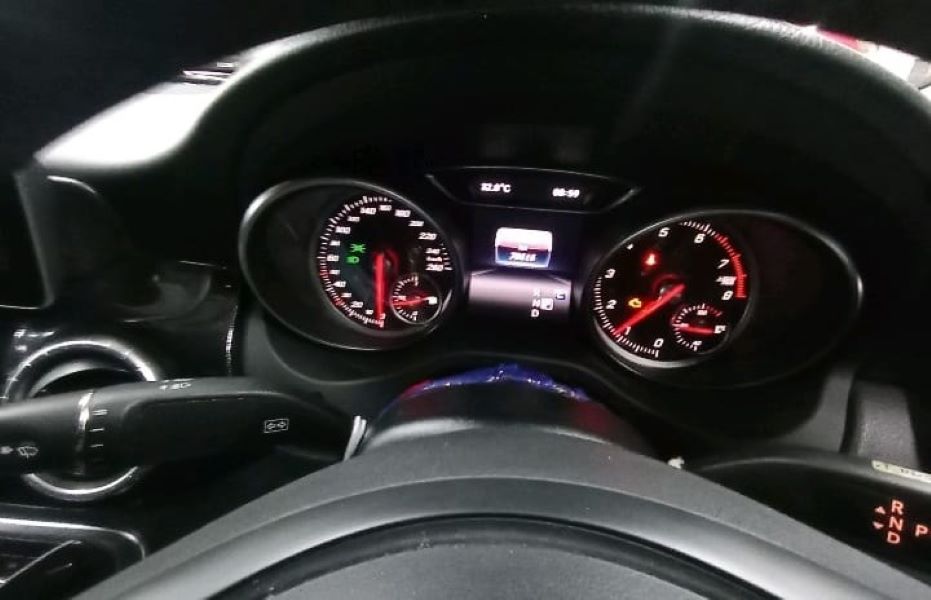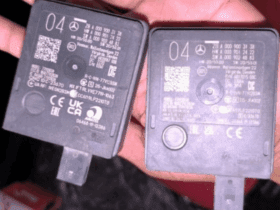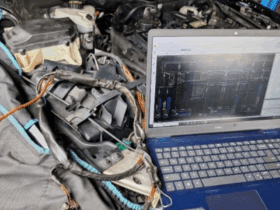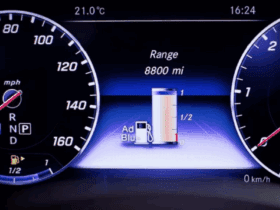Table of Contents
Why Does Engine Light Come On? Case Study: Mercedes-Benz CLA W117 with M270 Engine
The check engine light (CEL) is one of the most common warnings drivers face in modern vehicles. In the Mercedes-Benz CLA W117, equipped with the M270 engine, this warning can stem from minor issues such as a loose sensor connection or more complex faults involving engine management components.
In this real-world case study, we examine why the engine light came on in a CLA W117, how the problem was diagnosed, and the steps taken to resolve it. The culprit was identified as a faulty Camtronic Actuator, an essential part of the variable valve timing system.
This article is part of our Mercedes Check Engine Light – Complete Troubleshooting Hub, where you’ll find more detailed case studies and repair guides for Mercedes-Benz models.

Vehicle Overview
- Model: Mercedes-Benz CLA W117
- Engine: M270 (petrol, inline-4)
- Complaint: Engine light illuminated on dashboard
The vehicle initially showed no noticeable performance issues, but the persistent CEL indicated a malfunction detected by the engine management system.

Step 1: Initial Diagnostics
Quick Scan with XENTRY
The technician used the Mercedes-Benz XENTRY diagnostic system, retrieving fault codes stored in the ME (Motor Electronics) control unit.
- – Codes indicated a malfunction in the Camtronic Actuator.

What is the Camtronic Actuator?
The Camtronic Actuator controls variable valve timing in the M270 engine. By adjusting valve lift, it improves:
- – Fuel efficiency
- – Performance
- – Emissions
When it fails, incorrect valve timing signals trigger the CEL, even if the vehicle still drives normally.
Step 2: Systematic Troubleshooting
1. Socket & Connector Inspection
- – Technician disconnected the Camtronic Actuator socket.
- – Checked for dirt, corrosion, or damaged pins.
- – No defects detected.


2. Voltage Supply Testing
- – Supply voltage: Measured at 12.2V → correct.
- – Sensor output voltage: Measured at 5.01V → within expected range.
Despite correct readings, the CEL persisted, confirming the actuator itself was faulty.

Step 3: Repair Process – Replacing the Camtronic Actuator
Removal & Installation Steps
- 1. Disconnect battery to prevent electrical risks.
- 2. Remove faulty actuator carefully from the cylinder head.
- 3. Install new OEM Camtronic Actuator, ensuring correct alignment.
- 4. Reconnect battery and secure wiring.
- 5. Clear all fault codes using XENTRY.

Parts Used
- – Genuine Camtronic Actuator (OEM spec)
- – Dielectric grease (for connector protection)
Step 4: Post-Repair Testing
Test Drive
- – Vehicle driven for 20 minutes under mixed load conditions.
- – No reappearance of engine light.
Final Diagnostic Scan
- – Rechecked with XENTRY.
- – No fault codes stored.
- – All engine management functions normal.
Outcome
- – Root Cause: Faulty Camtronic Actuator
- – Repair: Replaced actuator, cleared codes
- – Result: CEL extinguished, normal performance restored
The customer left satisfied, reassured that the vehicle was repaired using correct OEM parts and diagnostic procedures.
Symptom – Cause – Fix Table
| Symptom | Likely Cause | Recommended Fix |
|---|---|---|
| Engine light on, no performance loss | Faulty Camtronic Actuator | Replace actuator |
| CEL with variable valve timing faults | Wiring issue at actuator socket | Inspect & clean connectors |
| Intermittent CEL, rough idle | Camtronic voltage irregularities | Perform voltage test, replace actuator if needed |
| CEL persists after clearing codes | Internal actuator fault | Replace with OEM actuator |
Lessons Learned
- 1. Voltage tests alone aren’t enough : Even with correct readings, actuators can fail internally.
- 2. OEM diagnostics are key : Mercedes XENTRY provided precise codes that led directly to the Camtronic fault.
- 3. Always clear codes properly : Leaving stored codes can cause the CEL to remain on unnecessarily.
- 4. Preventive inspections help : Checking sensor connectors during servicing can avoid premature failures.
FAQs: Why Does Engine Light Come On
Q: Why does the engine light come on in my Mercedes CLA W117?
It may indicate issues with sensors (O₂, MAF, Camtronic), ignition components, fuel delivery, or emissions systems.
Q: What are symptoms of a faulty Camtronic Actuator?
- – Persistent engine light
- – Fault codes for valve timing
- – In some cases, rough idle or reduced performance
Q: Can I drive with the check engine light on?
If steady: short trips are possible, but diagnosis is needed soon.
If flashing: stop immediately, as it signals misfires or serious damage risks.
Q: How much does it cost to replace a Camtronic Actuator?
Typically $350–$700, including parts and labor, depending on location and workshop rates.
Q: Will the engine light turn off automatically after repair?
Yes, once the actuator is replaced and codes are cleared, the CEL will stay off if the issue is resolved.
Preventive Tips
- – Use high-quality oil and filters to protect valve timing systems.
- – Have the engine scanned regularly during servicing.
- – Replace ignition and timing components on schedule.
- – Avoid extended idling, which stresses variable valve systems.
Conclusion
In this Mercedes-Benz CLA W117 case study, the engine light came on due to a faulty Camtronic Actuator. Even though voltage readings were within range, the actuator had failed internally. Using XENTRY diagnostics, the fault was identified, the actuator was replaced with an OEM part, and the issue was resolved successfully.
For technicians and owners alike, this highlights the importance of systematic diagnostics and professional repair when dealing with CEL issues in Mercedes vehicles.
Explore our Mercedes Check Engine Light – Complete Troubleshooting Hub for more case studies, repair solutions, and expert diagnostic advice.
Author Bio
Written by Mercedes Expert
With years of hands-on experience diagnosing and repairing Mercedes-Benz systems, he brings technical depth and practical case studies to help car owners, technicians, and enthusiasts troubleshoot complex automotive issues. His work focuses on clear repair guides, OEM-level procedures, and knowledge-sharing to empower both professionals and drivers.
Last update: September 2025
— Salim, Mercedes Expert
Independent specialist in Mercedes-Benz diagnostics, CAN Bus analysis, troubleshooting case studies, and EV systems.






Leave a Reply